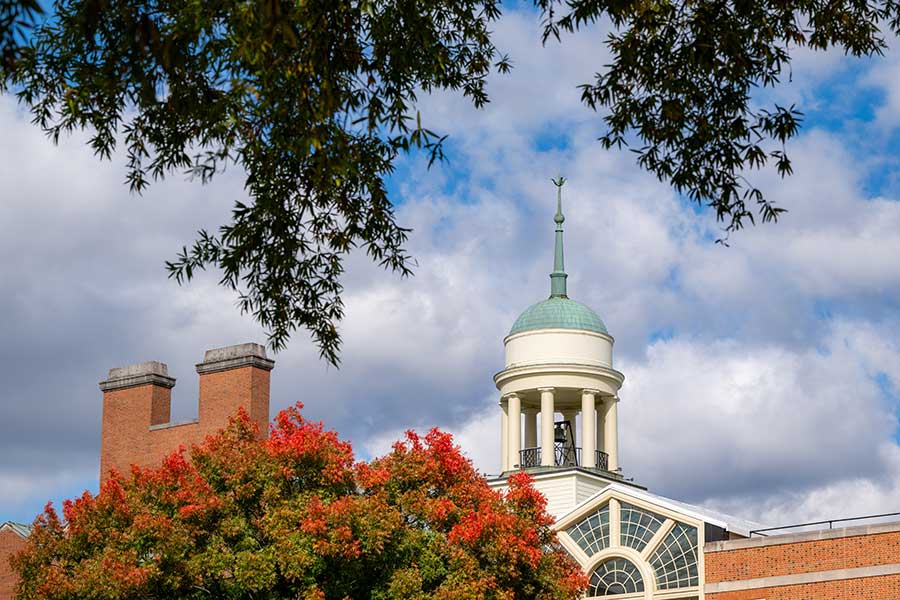Bee impressed at ACC Meeting of the Minds
You can’t teach an old dog new tricks, but this might not be the case for a honeybee.
Just ask David Hale (’15), a sophomore biology major. Hale has been studying the relationship between brain structure and cognitive function in honeybees since the summer after his freshman year.
He explains that as a honeybee ages, a pair of structures in its brain called mushroom bodies grow larger. Larger mushroom bodies may give older bees an advantage over their younger counterparts when it comes to learning and memorizing new things like the color of certain flowers. In nature, this would help older honeybees remember which flowers have more pollen, making them better foragers for the hive.
Hale went to biology professor and honeybee expert Susan Fahrbach to see if she would help him design a scientific study to investigate the phenomena.
With Fahrbach’s guidance, Hale designed a basic IQ test to see if older bees’ enlarged mushroom bodies make them more adept at associating color with reward.
After collecting bees of different ages and fitting them into a harness fashioned from a drinking straw, Hale exposed his tiny subjects to bursts of blue or green light from a projector to simulate different colored flower patches.
A flash of blue light signaled a sugary reward. A flash of green light signaled no reward. Hale put each bee through 20 trials and then reversed the experiment. His results showed that of the 64 bees that completed the test, older ones proved more capable at associating color with reward. The younger bees, the ones less than 10 days old, weren’t yet ready to learn.
Hale said putting together the experiment under Fahrbach’s guidance was the most challenging aspect of his collegiate career to date. His mentor took an available, yet hands-off approach, which allowed Hale to learn from his own mistakes.
“Instead of telling me what to do, professor Fahrbach told me to think outside of the box and come up with my own solution to the problems at hand,” Hale said.
From Honeybees to Humans: Meeting of the Minds
It is exactly this outside the box thinking that will be showcased at the Eighth Annual ACC Meeting of the Minds Undergraduate Research Conference, taking place April 4-6 at Wake Forest.
The three-day event, funded in large part by revenue from athletic events such as the ACC football championship, will showcase the work of nearly 100 undergraduate researchers from 12 ACC member schools.
“We are breaking down barriers between a group of the nation’s leading universities so that students from across the ACC can learn from one another and grow through shared experience,” said Richard Carmichael, professor of mathematics at Wake Forest and the University’s Faculty Athletic Representative.
Undergraduate REsearch and Creative Activities (URECA) Center, the Office of the Dean of the College and the Office of the Provost are organizing and sponsoring the event, which rotates from campus to campus each year.
“We are proud to celebrate the mentored or independent scholarship of such talented students from Wake Forest and other ACC institutions renowned for their commitment to scholarly and creative work and their dedication to outstanding undergraduate education,” said Jacquelyn Fetrow, Dean of Wake Forest College.
The URECA Center provides student grants (summer fellowships include $4,000 plus housing) and an administrative umbrella for mentored, undergraduate research and encourages and supports high-quality programs of great impact. Shannon Mihalko, associate professor of Health and Exercise Science and Co-Director of the URECA Center, said the program supports undergraduate scholars in all disciplines of Wake Forest College.
This year’s “Meeting of the Minds” also represents the first-ever ACC-sponsored event including the University of Pittsburgh and the University of Louisville.
“The expectation for undergraduates to participate in research has become standard for admittance into good graduate schools,” said Dale B. Billingsley, vice provost of Undergraduate Affairs and Enrollment Management at the University of Louisville. “Starting early is a really good thing to do for students who will be participating in research events like this for the rest of their careers.”
Josh Courtney, an English and political science major, will showcase his work analyzing linguistic trends in the writing of first-year Wake Forest students. He said working with his mentor Laura Aull, an assistant professor of English, not only gave him a realistic idea of what it is like to do research but also has him considering a PhD in linguistics after graduation.
“You don’t realize the amount of time and effort that goes into this kind of work until you do it,” Courtney said, adding that professor Aull is helping him to get his work published in an academic journal.
If you are going to attend
A complete schedule of events is available on the conference website. Wake Forest faculty known for their dedication to undergraduate research will give keynote addresses.
Friday’s keynote speaker will be Miles Silman, Professor of Biology and Director of the Center for Energy, Environment and Sustainability at Wake Forest. A leader in the sustainability movement, Silman has taken dozens of undergraduate students to the Amazon rainforest, where his work centers on understanding species distributions, biodiversity, and the response of forest ecosystems to climate and land use changes over time.
Saturday’s keynote speaker will be Christina Soriano, Associate Professor of Dance. Her mentee, senior Cynthia Huang, will dance to demonstrate their collaborative work on composer John Cage, which Soriano will address in her presentation called “Choreographing Cage: A model for undergraduate scholarship in the arts.”
Categories: Campus Life, Experiential Learning, Happening at Wake, Mentorship, Research & Discovery, University Announcements
Media Contact
Wake Forest News
media@wfu.edu
336.758.5237



